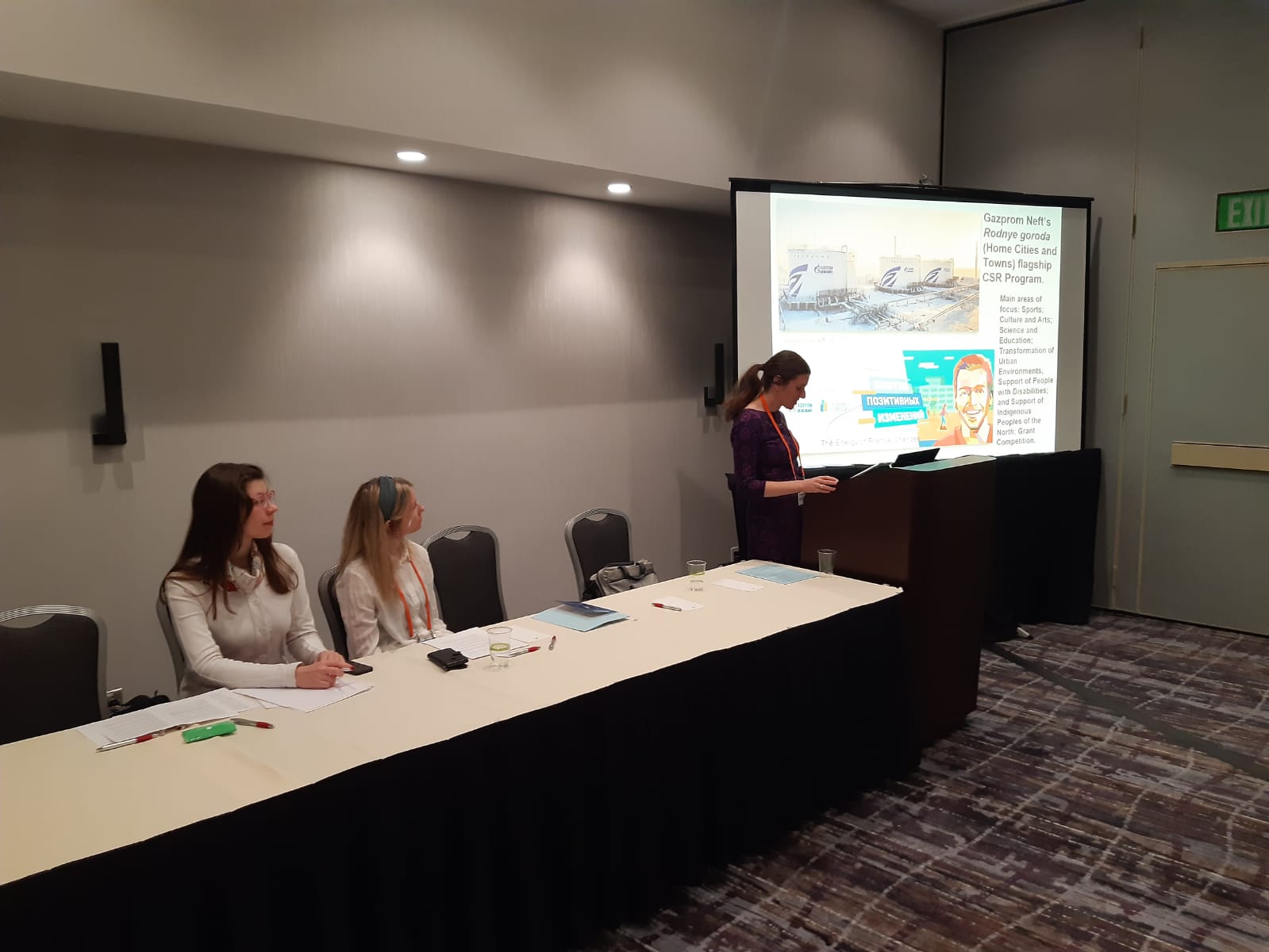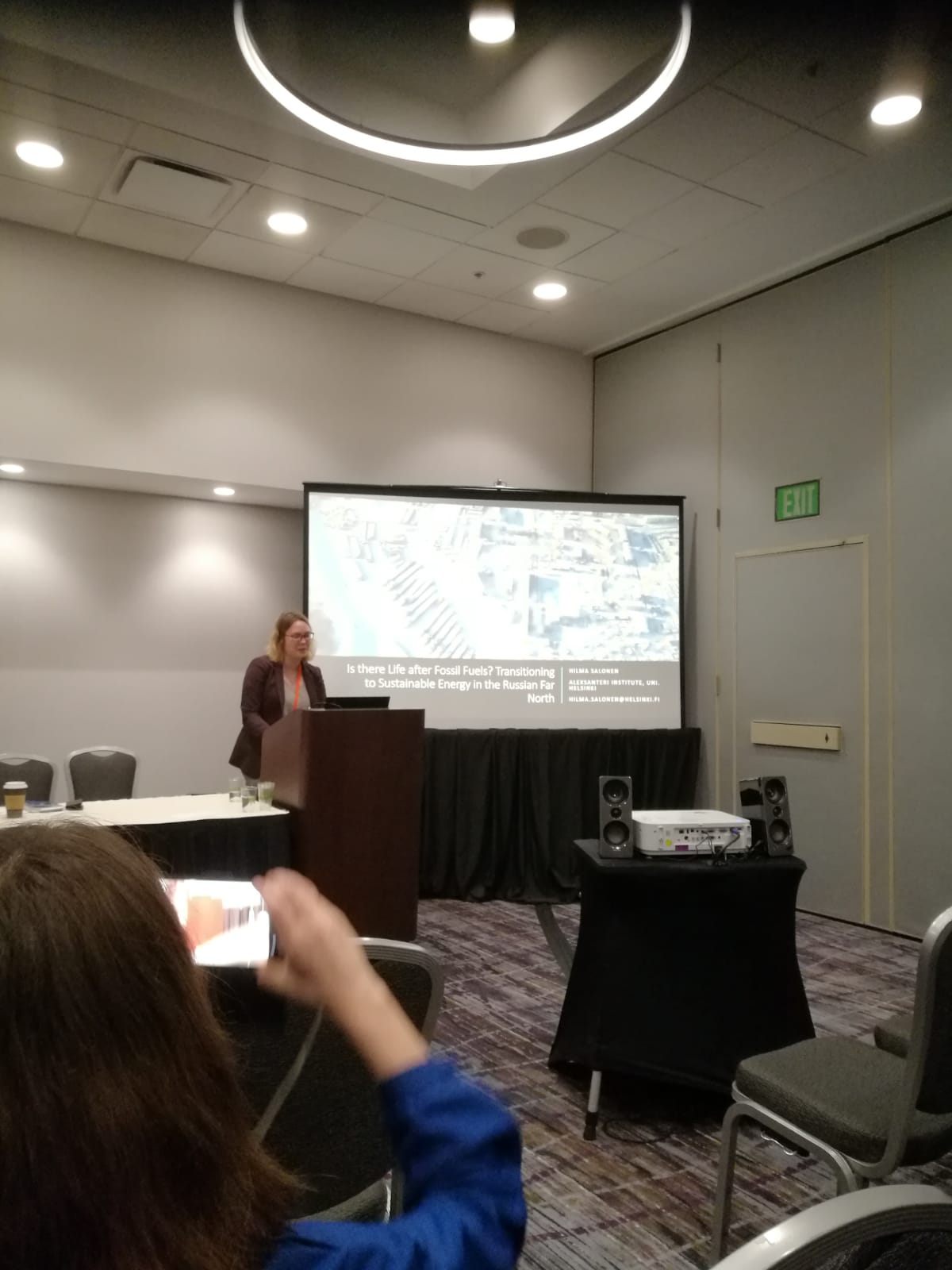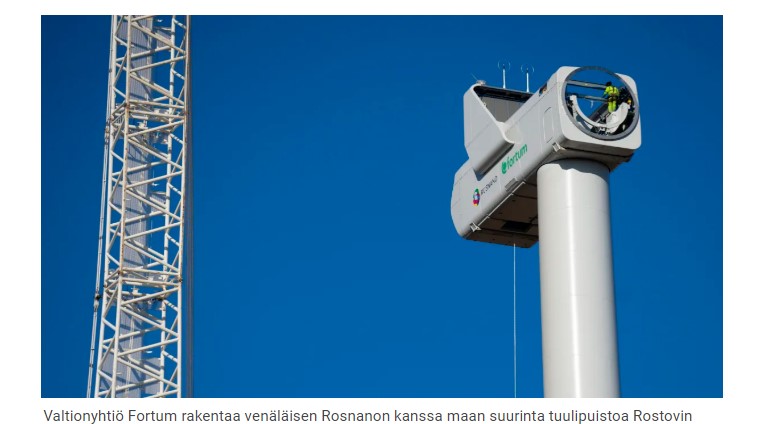This Wednesday Professor Tynkkynen took part in the workshop on EU-Russia Energy Dialogue, organised in St. Petersburg, Russia. The participants of the workshop discussed the geopolitics of energy transition and climate change mitigation in the EU-Russia context. The event was organised by the German Institute for International and Security Affairs already for the second time.
“A Research Agenda for Climate Justice” is out
“A Research Agenda for Climate Justice”, edited by Paul G. Harris and published by Edward Elgar Publishing, is out.
Climate change will bring great suffering to communities, individuals and ecosystems. Those least responsible for the problem will suffer the most. Justice demands urgent action to reverse its causes and impacts. In this provocative new book, Paul G. Harris brings together a collection of original essays to explore alternative, innovative approaches to understanding and implementing climate justice in the future. Through investigations informed by philosophy, politics, sociology, law and economics, this Research Agenda reveals how climate change is a matter of justice and makes concrete proposals for more effective mitigation.
In this volume you can find a chapter by Sanna Kopra, titled “Responsibility for climate justice: the role of great powers”.
A Research Agenda for #Climate Justice is out now. My chapter argues that great powers have special #responsibility to promote climate justice and the #EnglishSchoolofIR should restore moral-philosophical debate to the heart of its scholarship. https://t.co/857x8Vj2R2
— Sanna Kopra (@SannaKopra) November 28, 2019
More information about the book can be found on publisher’s website.
Talouspolitiikalla ilmastonmuutosta vastaan?
“Talouspolitiikalla ilmastonmuutosta vastaan?”, Tiedekulma, Helsinki, Finland
On 27th of September Finnish Ministry for Foreign Affairs organised a discussion panel on climate change titled “Talouspolitiikalla ilmastonmuutosta vastaan?” (With economic policy against climate change?”)
Talouspolitiikalla ilmastonmuutosta vastaan? Aiheesta alustavat @PekkaMoren, @MariPantsar, @A_Ahokas ja meidän @HurriKaroliina
#EU2019FI #ilmastonmuutos #COP25 pic.twitter.com/Hi6nZh8afU— Research Group on the Russian Environment (@rgrenvironment) November 27, 2019
The central focus of the Finnish EU Presidency is the EU’s global climate leadership, but what does it mean in practice? There is still time for the COP25 climate conference in Spain in December. What are the economic policy instruments for combating climate change? What is the joint initiative of the Finnish and Chilean finance ministries to combat climate change?
The discussion was moderated by Sitra’s Director Mari Pantsar and included Pekka Morén, Ministry of Finance, our PhD student Karoliina Hurri and young environmental activist Atte Ahokas.
Seuraavaksi @helsinkiuni:n @HurriKaroliina kertoo ilmastojohtajuudesta. 2020 on sen suhteen näytön paikka – silloin lyödään lukkoon lyhyen ja pitkän aikavälin tavoitteita, joilla on mahdollista ottaa johtajuus 1.5 asteen tavoitteen saavuttamisessa.#EU2019FI #ilmastonmuutos pic.twitter.com/ZBiUfPLZC3
— Eurooppatiedotus (@UM_ET) November 27, 2019
More information on the event.
Alla Bolotova took part in “The global life of mines: Mining and post-mining between extractivism and heritage-making” workshop at the University of Cagliari in Italy
On 21-22 of November “The global life of mines: Mining and post-mining between extractivism and heritage-making” workshop was organised at the University of Cagliari in Italy. The aim of the workshop was to bring together anthropological perspectives and ethnographic studies on mining and post-mining across a broad range of geographical contexts. The contributions explored links, interconnections and scales of articulations between the current booming of extractive industries, projects, and operations worldwide – along with the new rhetorics of
sustainability, ‘green’ and ‘blue’ economy etc.. – and the diversified consequences of
mine closures, ranging from abandonment and dereliction to new extractive processes
(heritage-making, ‘green’ economies etc).
Dr. Alla Bolotova took part in the workshop and presented there her paper “Living or Leaving? Youth and place marginalization in mining towns in the Russian Arctic” at the ‘Im/mobilities’ session.
Many young people finishing schools in mining towns in the Russian Arctic express their dreams to escape from their hometowns. Among main complaints are a lack of recreational opportunities, boredom, and soviet appearance of urban space in their localities. In this paper, I analyse lived experiences of young adults dwelling in the soviet-style urban space of Arctic mining towns and dealing with place marginalization. The new towns were built by the soviet state next to mineral deposits and were populated by incomers, stimulated to resettle up north by material benefits. Arctic mining towns became prosperous communities where town-forming enterprises were responsible for place maintenance. During the post-soviet period, international mining companies became owners of town-forming enterprises. Despite of successful internationalisation of mining enterprises, towns are still rooted in the soviet past, which continues to shape lives of contemporary youth. The territory around mining towns often looks devastated, due to industrial ruins, abandoned mines, destroyed buildings. Infrastructure of single-industry towns does not fulfill needs of modern young people that contributes to large-scale outmigration of youth. Drawing on long-term ethnographic fieldwork in Murmansk region, I analyse experiences and strategies of young adults coping with place marginalization and numerous problems in northern declining towns.
Wokrshop’s programme can be found here.
51st Annual ASEEES Convention, San Francisco, USA
Our team is participating in the 51st Annual ASEEES Convention, held on 23-26 of November in San Francisco, USA.

On 23 November Dmitry Yagodin chaired a panel “Emergent Energies and their Intersection with State, Society and Culture in the Russian Arctic”. Stephanie Hitztaler presented there a paper “A Sustainable Yamal? A Critical Look at Corporate Social Responsibility and its Contribution to Short- and Long-Term Urban Vitality in Yamalo-Nenets Autonomous Okrug” and Sohvi Kangasluoma talked about “Masculine Industry, Feminine Environment? A Gender-Based Look at Media Representations of Arctic Hydrocarbon Companies”.
Later that day Stephanie Hitztaler was chairing a panel “The Politics and Perception of Climate Change and Renewable Energy Discourse from the Russian Far North to Central Asia”. Dmitry Yagodin gave a talk about “Convenient Truth: The Roots of Climate Denial in the Official Discourse in Russia” and Hilma Salonen presented her paper “Is there Life after Fossil Fuels?”.
Fortum builds Russia’s largest wind farm
Professor Tynkkynen provided comments for Yle’s new article “Fortum rakentaa Venäjän suurinta tuulipuistoa – Turbiineja arvostellaan Putinia myöten: “Ne värähtelevät niin, että madot ryömivät maasta“. Venäjä kehittää tuuli- ja aurinkovoimaa. Se ei kuitenkaan aio irtautua fossiilisesta energiasta” (Fortum builds Russia’s largest wind farm – Turbines were criticized by Putin: “They vibrate so that worms crawl out of the ground”. Russia is developing wind and solar power. However, it does not intend to break away from fossil energy.)
Veli-Pekka Tynkkynen, Associate Professor of Russian Environmental Studies at the University of Helsinki, does not believe that Russia’s current leadership wants to, or even can, move away from fossil fuels.
– Putin’s administration is clinging to hydrocarbons. Their role in the economy and society in general is too big, says Tynkkynen, referring to the role of the traditional energy sector in the country’s power structures and in building the nation’s identity.
Read full article on Yle website.
China in the Polar “Zone of Peace”
Sanna Kopra wrote an article for the Ecowall – a collaborative research platform seeking a clearer picture of the China-Europe relationship in all its dimensions, The article is titled “China in the Polar “Zone of Peace”” and aims to answer a question “what kind of security risks for the Arctic states and peoples could accompany China’s regional engagement?”
At present, however, the emerging security impact of China’s growing Arctic foothold remains mainly political and economic in nature. If the economies of northern municipalities or entire Arctic states become very dependent on Chinese investments, their vulnerability to fluctuations in the Chinese economy, for example, may increase. Such economic dependence might also result in political pressure to pay greater attention to China’s interests in political decision-making at a local or national level, even to a degree that Arctic states’ own values and national interests – including long-term economic interests – are adversely affected.
Read article online here.
Arctic Spirit Conference
On 12-13 of November the Arctic Spirit conference was organised in Rovaniemi. The Conference is an official side event of Finland’s Presidency of the Council of the European Union. Thus, the Conference also enhances Arctic discussion during the Presidency.
This year the conference focused on climate change, especially from the viewpoint of young people and future generations living in the Arctic. The first conference day consisted of invited keynote speeches and panel discussions focusing on the voice of Arctic youth and the different levels of climate-related decision-making. From our research group, Sanna Kopra participated in the panel discussion “Climate Decision-Making – Why Is It So Difficult?”.
Climate decision-making – why is it so difficult?
– no universal understanding what it means to be responsible
– contemporary notions of climate responsibility are based on short-term economic growth- and state-centric approach
– lack of leadership
says @SannaKopra #arcticspirit pic.twitter.com/9x5OoC2XAM— Elena Gorbacheva (@LenaAGorbacheva) November 12, 2019
On the second day, the parallel thematic sessions looked at the main theme from various angles. Alla Bolotova and Elena Gorbacheva participated in the “Live, Work Or Leave? Youth-Well-Being And The Viability Of Arctic Towns And Cities” session and gave a presentation “Recycling initiatives of youth in industrial cities in the Russian Arctic: environmentally responsible behaviour in the absence of structural opportunities”. The session was arranged by the Wollie project, and many of the project’s participants from Russia and Finland shared their current results. The session lasted all day and culminated with a fruitful discussion on what is special about the Arctic youth in different states – or is there anything special about it at all?
More information about the Arctic Spirit can be found on the conference website.
Suomen kaasumarkkina avautuu ja kaasu alkaa virrata Viron ja Suomen välillä – Vaikutus: hinta laskee, huoltovarmuus paranee, riippuvuus Venäjästä vähenee
Professor Veli-Pekka Tynkkynen provided comments for the new newspaper article “Suomen kaasumarkkina avautuu ja kaasu alkaa virrata Viron ja Suomen välillä – Vaikutus: hinta laskee, huoltovarmuus paranee, riippuvuus Venäjästä vähenee” (“Finnish gas market opens and gas starts to flow between Estonia and Finland – Impact: price falls, security of supply improves, dependence on Russia decreases”).
So far, Finland has been almost completely dependent on Russian natural gas, says Veli-Pekka Tynkkynen, Assistant Professor of Russian Environmental Policy at the Aleksanteri Institute.
– The gas pipeline from Estonia will allow competitive tendering, which is likely to affect Russian gas pricing as well. The market price is expected to fall by at least a few percent, but the impact may be greater, Tynkkynen estimates.
Modernization of Russian district heating systems with the help of biomass energy – A Gordian knot?
Doctoral Candidate Hilma Salonen published her new article “Modernization of Russian district heating systems with the help of biomass energy – A Gordian knot?” in “Environmental Innovation and Societal Transitions” journal.
The article discusses the prospects of local wood waste resources as replacements for fossil fuel imports in the remote settlements of the Russian North from a viewpoint of a case study: the Arkhangelsk region and its outdated heating and fossil fuel delivery systems. Drawing on energy transition literature and expert interviews, the most influential factors are defined in geographic-infrastructural, institutional, financial, and behavioral contexts. In conclusion, the article determines that a key issue is that the constraints for alternative energy sources reinforce each other, while the actors working for them find themselves in an isolated position. This is especially true for the institutional and financial constraints. However, by examining the enabling factors it is possible to see how the bundle of constraints could also be undone together. Most efficient way for success would likely be helping municipalities and actors in the fields of biomass and energy production to form joint clusters and share resources.
This enlightening article can be read online.




